If you're studying First Flight Chapter 4 From The Diary of Anne Frank for your CBSE Class 10 English exams, you'll want to make sure you're prepared for any questions that may come your way. Here are some important questions and answers to help you ace your exam and deepen your understanding of this powerful and moving story.
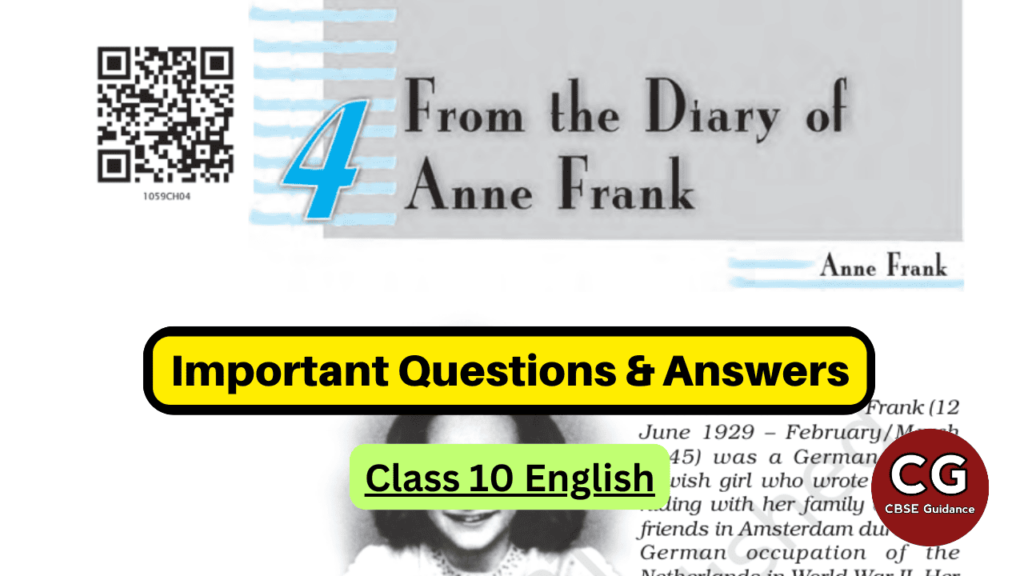
| Subject | English Language & Literature |
| Class | 10 |
| Board | CBSE |
| Chapter Name | From the Diary of Anne Frank |
| Chapter No. | 4 |
| Type | Important Questions and Answers |
| Session | 2024-25 |
| Book Name | First Flight |
| Literature | Prose |
Success is the result of nothing more than a few simple disciplines, practiced every day.
- Jim Rohn
From the Diary of Anne Frank Class 10 Extra Questions & Answers
Q. No. 1) Multiple Choice Questions based on an extract.
“’Paper has more patience than people’ I thought of this saying on one of those days when I was feeling a little depressed and was sitting at home with my chin in my hands, bored and listless, wondering whether to stay in or go out. I finally stayed where I was, brooding: Yes, paper does have more patience, and since I’m not planning to let anyone else read this stiff-backed notebook grandly referred to as a ‘diary’, unless I should ever find a real friend, it probably won’t make a bit of difference.”
i. ‘Paper has more patience than people.’ What does this imply?
This implies that Anne
a. believed in the power of writing more than speaking to people.
b. felt that she could pour her heart out on paper without any hindrance.
c. had more faith in sharing her thoughts and feelings with paper.
d. felt that she could share her feelings openly on paper.
Ans. Option (b)
ii. Pick out the emoticon which clearly brings out the meaning of ‘listless’ as used in the extract?

a. Option (i)
b. Option (ii)
c. Option (iii)
d. Option (iv)
Ans. Option (d)
iii. Pick the option that is ODD out with reference to the meaning of ‘patience’.
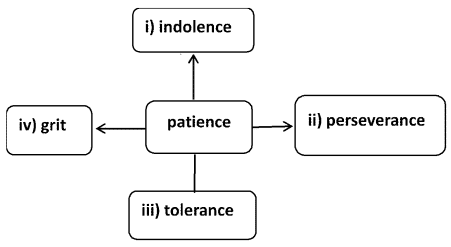
a. Option (i)
b. Option (ii)
c. Option (iii)
d. Option (iv)
Ans. Option (a)
iv. If the diary were a ‘real friend’, what qualities would Anne expect it to have?
Pick the option that lists these correctly.
- optimistic
- good listener
- confidant
- energetic
- non-judgmental
- outgoing
- ambitious
a. 1 & 4
b. 5, 6 & 7
c. 2, 3 & 5
d. 3 & 7
Ans. Option (c)
v. Pick out the sentence that brings out the meaning of ‘brooding’ as used in the extract?
a. The mysterious house on the hill is still brooding above the village.
b. The people at the stock market always keep brooding about the gains.
c. He was brooding over the matter and took a long time to decide.
d. Suspense and drama were brooding at the site of the investigation
Ans. Option (c)
vi. Anne doesn’t plan to let anyone else read her diary as
a. she is secretive about her life.
b. it’s about her intimate feelings.
c. she is unwilling to share it with anyone.
d. she wants to cherish these moments herself.
Ans. Option (b)
vii. Pick the option that lists the image that most appropriately corresponds to ‘chatterbox’.
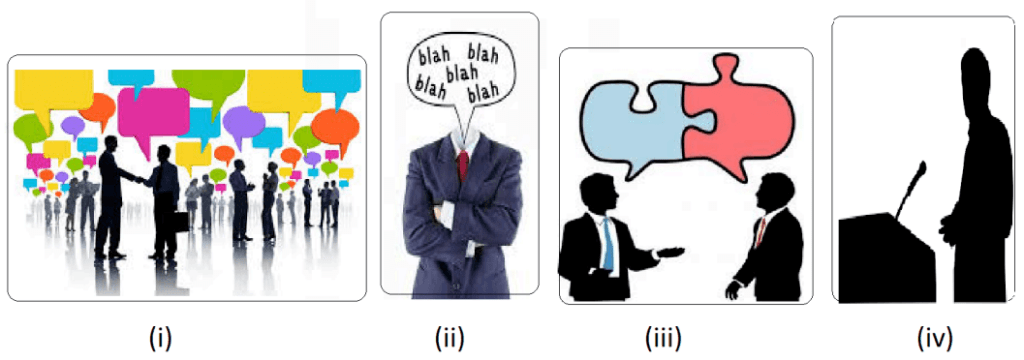
a. image (i)
b. image (ii)
c. image (iii)
d. image (iv)
Ans. Option (b)
Q. No. 2) Read the given extract to attempt the questions that follow:
Let me put it more clearly since no one will believe that a thirteen-year-old girl is completely alone in the world. And I’m not. I have loving parents and a sixteen-year-old sister, and there are about thirty people I can call friends. I have a family, loving aunts, and a good home. No, on the surface I seem to have everything, except my one true friend. All I think about when I’m with friends is having a good time. I can’t bring myself to talk about anything but ordinary everyday things.
(From the Diary of Anne Frank)
i. Why does Anne feel the following?
…no one will believe that a thirteen-year-old girl is completely alone in the world.
- People knew she had a family.
- People rejected the idea of loneliness.
- She had several friends.
- She had a cheerful personality.
- Her life was comfortable.
Choose the correct option from the following:
a. (1) and (5)
b. (1), (3), and (4)
c. (2) and (3)
d. (2), (4), and (5)
Ans. Option (b)
ii. Select the most appropriate option for (1) and (2).
- …on the surface I seem to have everything, except my one true friend.
- Anne doesn’t truly connect with anyone.
a. (1) is true and (2) is false.
b. (2) is the opposite of (1).
c. (1) furthers the meaning of (2).
d. Both (1) and (2) cannot be inferred from the extract.
Ans. Option (c)
iii. From the options given below, identify Anne’s tone in the extract.
a. restless
b. dissatisfied
c. scared
d. hurt
Ans. Option (b)
iv. Select the option which displays an example of ‘having a good time’.
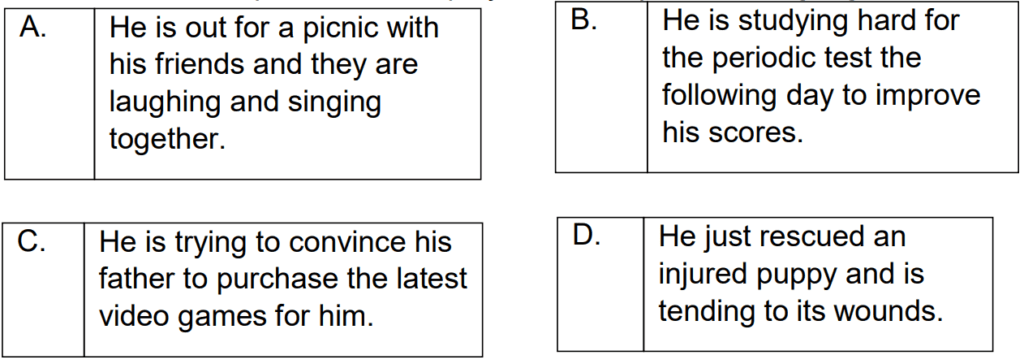
a. Option (A)
b. Option (B)
c. Option (C)
d. Option (D)
Ans. Option (a)
v. What do we get to know about Anne when she says the following?
I can’t bring myself to talk about anything but ordinary everyday things
Choose one from the following to answer:
a. She is proud of her ways.
b. She is struggling to strike up conversations.
c. She is unsure of her own thoughts.
d. She is unable to have a satisfying conversation
Ans. Option (d)
Q. No. 3) Read the given extract to attempt the questions that follow:
Half the class is making bets. G.N. and I laugh ourselves silly at the two boys behind us, C.N. and Jacques, who have staked their entire holiday savings on their bet. From morning to night, it's "You're going to pass", "No, I'm not", "Yes, you are", "No, I'm not". Even G.'s pleading glances and my angry outbursts can't calm them down. If you ask me, there are so many dummies that about a quarter of the class should be kept back, but teachers are the most unpredictable creatures on earth.
I'm not so worried about my girlfriends and myself. We'll make it. The only subject I'm not sure about is maths. Anyway, all we can do is wait. Until then, we keep telling each other not to lose heart.
(From the Diary of Anne Frank)
i. How do Anne and her friend react to the boys behind them?
- They are irritated by them.
- They find them humourous.
- They find them fascinating.
- They are disgusted by them.
- They are disappointed in them.
Choose the correct option from the following:
a. (1) and (2)
b. (2) and (5)
c. (1), (2), and (3)
d. (1), (4), and (5)
Ans. Option (a)
ii. Select the option that shows the correct relationship between (1) and (2).
- C. N. and Jacques keep making bets about passing.
- Anne mentions that teachers are very unpredictable.
a. (1) furthers the meaning of (2).
b. (1) is false but (2) is true.
c. (2) is a reason for (1).
d. (2) is an effect of (1).
Ans. Option (c)
iii. The girls (Anne and G.) and the two boys (C.N. and Jacques) are both __________.
a. confident about passing in maths
b. making fun of the 'dummies' in the class
c. telling each other that they will be promoted
d. spending money on a gamble about passing
Ans. Option (c)
iv. Half the class is making bets because they __________.
a. want to spend money
b. want to disturb each other
c. don't know if they will pass
d. are 'dummies' who like playing games
Ans. Option (c)
v. Why does Anne say the line below?
Anyway, all we can do is wait.
a. because she believes that patience is a virtue
b. because she knows that she will succeed in due time
c. to stop worrying about something that is not in her control
d. to convince herself and her girlfriends that they will pass in math
Ans. Option (c)
Q. No. 4) “Mr Keesing had a good laugh at my arguments, but when I proceeded to talk my way through the next lesson, he assigned me a second essay. This time it was supposed to be on ‘An Incorrigible Chatterbox’. I handed it in, and Mr Keesing had nothing to complain about for two whole lessons. However, during the third lesson, he’d finally had enough. “Anne Frank, as a punishment for talking in class, write an essay entitled-‘Quack, Quack, Quack, said Mistress Chatterbox’.”
i. What convincing argument was made by Anne?
a. She was talkative just like any other student in the class.
b. She had the right to be talkative, as it was a classroom and not a prison.
c. She had inherited the trait from her mother, so couldn’t stop being talkative.
d. She found it impossible to be quiet like the others as she couldn’t change herself.
Ans. Option (c)
ii. What does ‘had a good laugh’ imply, in the context of Mr. Keesing?
It means that he
a. celebrated his ability to make Anne write the essay.
b. ridiculed Anne in front of the whole class.
c. pulled up Anne for her arguments in the essay.
d. realized the humor in it and was amused.
Ans. Option (d)
iii. Based on this extract, pick the option with the list of words that best describe Mr. Keesing.
a. jovial and creative
b. strict and innovative
c. tolerant and strict
d. innovative and jovial
Ans. Option (b)
iv. Why do you think Mr Keesing chose the title - ‘An Incorrigible Chatterbox’ - for Anne, to write on?
This was so because he expected
a. Anne to express her inability to elaborate on such a topic.
b. that this would embarrass Anne and would check her indiscipline.
c. her to apologize and not repeat her talkative behavior.
d. Anne to explore her creative writing skills.
Ans. Option (b)
v. How did Anne feel when she was punished the third time by Mr. Keesing? She
a. was happy as she had to write three essays on the same topic.
b. enjoyed making fun of Mr. Keesing in her own way.
c. was worried as she had run out of original ideas for her essay.
d. was thrilled at another opportunity to showcase her writing abilities.
Ans. Option (c)
Q. No. 5) Anne wrote in her diary to get things off her chest. List any two reasons why getting things off one’s chest is recommended by counselors as therapeutic.
Ans. Getting things off one's chest is recommended by counselors as therapeutic for two main reasons:
- Emotional release: Expressing one's thoughts and feelings can provide a sense of emotional release and relief, allowing individuals to process and manage their emotions more effectively.
- Clarity and perspective: Sharing concerns and experiences helps individuals gain clarity and perspective on their problems, enabling them to gain new insights, problem-solve, and make informed decisions about their lives.
Q. No. 6) Kitty was a trusted friend to Anne. Elaborate.
Ans. Kitty was a trusted friend to Anne.
- allowed her to express her thoughts and feelings freely without fear of rejection
- provided her with a space to confide in and unburden herself, serving as a form of therapy for her loneliness and isolation
- it couldn't talk back but the act of writing and personifying the diary as a friend gave Anne a sense of comfort and companionship, providing her with an outlet to process her emotions and cope with her challenges
- gave her a sense of privacy and security --she felt that she could write down her innermost thoughts and feelings without fear of judgement or ridicule, as she might have experienced if she shared them with others.
Q. No. 7) Kitty plays a vital role in Anne’s life. Elucidate.
Ans.
- Got on her 13th birthday
- Her father gifted her
- Gave diary a nickname, ‘Kitty’
- Became her companion as well as a good and trusted friend.
- Confides everything with her
- Pen down her thoughts and feelings
- Listens to Anne without any advice and preconceptions
Q. No. 8) Explain the emotion vested in Anne’s statement, “…I was plunked down on the table as a birthday present for Margot.”
Ans. The statement reflects Anne's feeling of being treated as an object rather than a person as if she were just a gift to be presented without her own agency or value.
Q. No. 9) Enumerate any two reasons that justify Mr. Keesing’s displeasure at Anne’s talking in class.
Ans. Mr. Keesing's displeasure at Anne's talking in class can be justified by two reasons:
- Disruption of the learning environment: Anne's talking can disrupt the class, distract other students, and hinder their ability to concentrate and learn effectively.
- Disrespect for authority: Anne's talking can be seen as a lack of respect for the teacher's authority and the rules of the classroom, which can undermine the teacher's ability to maintain discipline and manage the class.
Q. No. 10) Comment on the teacher-student relationship shared between Anne and Mr. Keesing.
Ans. The teacher-student relationship between Anne and Mr. Keesing is characterized by tension and conflict. Anne's lively and outspoken nature clashes with Mr. Keesing's desire for discipline and order in the classroom, leading to frequent disagreements and a strained dynamic between them.
Q. No. 11) Clarify why it is fair to say that Mr. Keesing was innovative with his punishments.
Ans. It is fair to say that Mr. Keesing was innovative with his punishments for several reasons.
Firstly, instead of resorting to traditional forms of punishment like detention or writing lines, Mr. Keesing employed creative and unconventional methods to address Anne's behavior. For instance, he assigned her essays on topics related to her talkativeness, aiming to make her reflect on her actions and their consequences.
Secondly, Mr. Keesing's approach demonstrated a willingness to adapt his disciplinary methods to suit individual students. He recognized that traditional punishments might not have been effective with Anne, who had a strong personality and needed more thought-provoking consequences. By devising punishments that challenged Anne intellectually, he aimed to make her consider the impact of her behavior on her education and personal growth.
Q. No. 12) Why did Mr. Keesing call Anne ‘an incorrigible chatterbox’?
Ans. Anne was very talkative, didn’t stop despite being punished, wrote an essay as a punishment, and justified her over-talkative nature.
Q. No. 13) Do you agree with Anne when she says that teachers are the most unpredictable creatures on earth? Rationalize.
Ans. Anne's statement about teachers being the most unpredictable creatures on earth might stem from her experiences with Mr. Keesing and possibly other teachers. It could be influenced by instances where teachers' actions or moods seemed inconsistent or surprising to her, leading her to perceive them as unpredictable. However, it's important to note that generalizing this perception to all teachers may not be accurate, as teacher behavior can vary greatly depending on individual personalities and circumstances.
Q. No. 14) Give two reasons to support the opinion that Anne's diary is interesting to readers.
Ans.
- The Diary of Anne Frank is a personal account of one family's experience of hiding from the Nazis during the war.
- Written through the perspective of a 13-year-old, it brings to the fore the horrors of war and racial persecution and personalizes its impact.
Result - Different from purely historical accounts, which include facts and data; Anne's diary presents an account of war through the eyes of a young girl.
Q. No. 15) Annie writes that it was fortunate that Mr. Keesing took the joke the right way. Why does she feel so?
Ans. The Poem referred to the father swan who bit his three ducks because they quacked too much; an allusion to Mr. Keesing.
Poem written to turn the joke around on Mr. Keesing; metaphorically convey the value of talking
Fortunate that Mr. Keesing got the joke, else, the disciplinary action could have been severe.
Q. No. 16) Anne says that there were so many dummies in the class that about a quarter of them shouldn’t be promoted. Is she being rude or brutally honest? Evaluate.
Ans. Anne's statement can be seen as a mix of both rudeness and brutal honesty. While her remark may come across as rude due to the derogatory term "dummies," it also reflects her honest assessment of the academic abilities of her classmates. However, her choice of words lacks sensitivity and empathy, which may be perceived as disrespectful or hurtful by others.
Q. No. 17) Anne bid a ‘heartbreaking farewell’ to Mrs. Kuperus. As Anne, write a brief farewell note to Mr. Keesing after being promoted to the next class.
Dear Mr. Keesing
It has been …………………………………………………………………………
Ans.
Dear Mr. Keesing,
It has been an eventful journey in your classroom, filled with both challenges and growth. I want to express my heartfelt gratitude for your guidance and patience. Your innovative punishments pushed me to introspect and learn. Farewell, and may you continue to inspire and shape young minds.
Sincerely,
Anne
Q. No 18) Anne said that the only thing missing was the presence of a true friend.
Imagine that Anne had access to the internet and had chosen to blog instead of writing a diary.
As Anne, write a blog post on the value of a true friend.
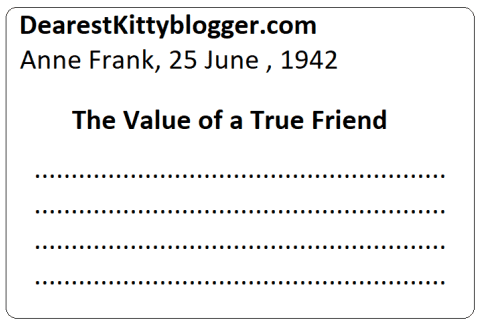
Ans.
DearestKittyblogger.com
Anne Frank, 25 June 1942
The Invaluable Treasure of a True Friend
Hey there, fellow readers!
Today, I want to delve into the significance of something we all long for a true friend. You see, despite the vastness of the internet, the virtual world can sometimes leave us feeling lonely and disconnected. Amidst the sea of followers and likes, what truly enriches our lives is the presence of a genuine companion.
A true friend is like a beacon of light in the darkest of times. They lend a listening ear, offering solace and understanding when we need it the most. Their unwavering support and encouragement fuel our dreams and aspirations, propelling us toward success.
But it's not just about having someone to lean on during tough moments. A true friend celebrates our joys, amplifying them with genuine happiness. They bring laughter and spontaneity into our lives, creating memories that will be etched in our hearts forever.
In this fast-paced digital age, where connections can often feel superficial, a true friend is a rare gem. They are the ones who see beyond the filtered versions of ourselves, embracing us with our flaws and quirks. Their presence brings authenticity and depth to our lives.
So, let's treasure those true friends who have stood by us through thick and thin. Let's cherish the moments of laughter, tears, and shared experiences. And if you're still searching for that special bond, remember to nurture your connections, invest time and effort, and be open to the beautiful possibility of finding a true friend.
Until next time, keep spreading love and forging meaningful friendships!
Yours,
Anne
Q. No. 19) Your teacher has organized a debate and you have been asked to speak on: ‘Consequences and Positive Reinforcements Have a Great Impact on Student Behaviour’. Write the debate script with three-four points to supplement your stand, either as a proposition speaker or as an opposition one.
Ans.
Debate: Consequences and Positive Reinforcements Have a Great Impact on Student Behavior
Proposition Speaker:
Ladies and gentlemen, honorable judges, and fellow debaters,
Today, I stand before you as a proposition speaker to argue that consequences and positive reinforcements indeed have a great impact on student behavior. Allow me to present my points in support of this stance:
Point 1: Learning Responsibility and Accountability:
Consequences provide students with an understanding of responsibility and accountability for their actions. When students face the outcomes of their behavior, whether positive or negative, they learn to take ownership of their actions and make better choices in the future.
Point 2: Encouraging Desired Behavior:
Positive reinforcements, such as praise, rewards, and recognition, are powerful tools that motivate students to exhibit desired behavior. By acknowledging and rewarding their efforts, we create a positive and encouraging environment that fosters growth, learning, and continued positive behavior.
Point 3: Shaping Ethical Values:
Consequences and positive reinforcements play a vital role in shaping students' ethical values. When consequences align with ethical principles, they teach students about the importance of integrity, honesty, and respect for others. Positive reinforcements for ethical behavior reinforce these values and encourage students to uphold them.
In conclusion, consequences and positive reinforcements have a profound impact on student behavior. They promote responsibility, motivate desired behavior, and shape ethical values. By implementing effective consequences and incorporating positive reinforcements, we can foster a conducive learning environment that promotes growth and development in our students.
Thank you.
Q. No. 20) You are stressed and anxious since your Annual results are going to be announced soon. You decide to meet the school counsellor to share your anxiety and apprehensions. Write the dialogue between you and your school counsellor.
You may begin like this:
School Counsellor: Hello Anne, please sit down. You look very disturbed and irritated. What’s the matter?
You: Well, to be honest, we all are disturbed. But the irritation is because of the two boys sitting behind……………
School Counsellor: First of all, you need to relax. Take a deep breath. How do you feel we can deal with this situation rationally?
You: .......................................................................(continue)
Ans.
School Counsellor: Hello Anne, please sit down. You look very disturbed and irritated. What's the matter?
You: Well, to be honest, we all are disturbed. But the irritation is because of the two boys sitting behind me. They keep making distracting noises during class, and it's hard for me to concentrate. It's even worse now that the results are about to be announced. I'm anxious and stressed about my performance, and their behavior adds to the pressure.
School Counsellor: First of all, you need to relax. Take a deep breath. How do you feel we can deal with this situation rationally?
You: Thank you, I'll try. Regarding the situation with the boys, I believe open communication might help. Maybe I could politely approach them and explain how their distractions affect my focus and request them to be more considerate during class. Additionally, it would be helpful if the teacher is made aware of the issue, so they can address it and ensure a conducive learning environment for everyone.
School Counsellor: That's a good approach, Anne. Effective communication is key. Remember to express your concerns assertively and seek a resolution. As for your anxiety about the upcoming results, it's normal to feel that way. Remember that results don't define your worth. Focus on your preparation, manage your time effectively, and try to engage in relaxation techniques like deep breathing or mindfulness to reduce stress.
You: Thank you, I'll keep that in mind. It's reassuring to have someone to talk to about these concerns.
School Counsellor: I'm here to support you, Anne. Remember, you're not alone in this journey. If you need further guidance or support, don't hesitate to reach out to me or any trusted adult. Together, we'll work through these challenges and help you navigate this stressful period.
You: Thank you, I appreciate your help and guidance.
School Counsellor: You're welcome, Anne. Take care of yourself, and remember to focus on your well-being along with your studies. You've got this!
You: I will, thank you again for your support.
Q. No. 21) Anne was a sensitive and mature girl. From the chapters and poems in your textbook, First Flight, think of any two characters who could be her friends or confidantes.
Analyze the common character traits that would help in creating this special bond of friendship.
Ans. From the chapters and poems in the textbook "First Flight," two characters who could potentially be Anne's friends or confidantes are:
- Mijbil from the chapter "Mijbil the Otter": Mijbil, the otter, and Anne could have formed a unique bond due to their shared sense of curiosity and love for nature. Both Mijbil and Anne exhibit a deep appreciation for the natural world, and their curiosity about each other's experiences and perspectives could have fostered a strong connection.
- The postmaster from the chapter "A Letter to God": The postmaster could have been a trusted friend and confidante for Anne due to his wisdom and kindness. Both, the postmaster and Anne possess a compassionate nature, as seen in their empathy towards others and their desire to make a positive difference in the lives of those around them. Their shared values of empathy, kindness, and the belief in the power of goodness could have helped create a special bond between them.
Hope you liked these Important Questions & Answers on Class 10 English First Flight Book Chapter 4 From the Diary of Anne Frank by Anne Frank. Please share this with your friends and do comment if you have any doubts/suggestions to share.
thank you sir ,you are so hardworking
Thanks sir questions are very interesting and helped so much❤️